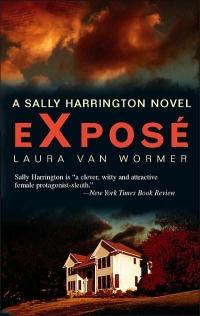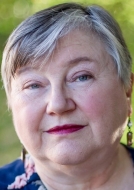 THE TRADWIFE'S SECRET |
 Sunshine, secrets, and swoon-worthy stories—June's featured reads are your perfect summer escape. |

Purchase
MIRA Romance Suspense, Romance Contemporary Excerpt of Expos by Laura Van WormerChapter One I am the reporter at the Castleford Herald-American who argues the most with our editor, which means said editor has more or less assigned Crazy Pete Sabatino and his conspiracy theories permanently to me. “And you know those kids on the milk cartons?” Pete is whispering as he leans forward in my cubicle at the paper. “You mean the missing children?” “Yes,” he answers solemnly. “They’re taking them. The Masons are.” The linchpin of Pete’s conspiracy theory is that George Bush and six other Masons secretly rule the world. I must confess, this theory does not frighten me the way it’s supposed to, no doubt because I am White Anglo-Saxon Protestant myself, descended from a long line of New England Republicans. (Though it should be noted that my voting record sometimes wildly strays from the ancestral patterns.) “The Masons are taking the children to the aliens for genetic research,” Pete continues. “Remember the alien vortex I told you about?” “In Long Island, near the Brook Haven labs,” I say patiently. “Where you said we shot down the TWA flight because we were shooting at an alien ship coming into the vortex.” “Right. That’s where they’re taking the children.” When I don’t say anything, he stresses, “Look, Sally, I’ve read about this, I’ve talked to people about it, and I’ve seen evidence. I know. I know.” Crazy Pete has not always been this way. My neighbor, who used to take piano lessons right after Pete at Mrs. Fothergill’s when they were young, said it was only after Pete turned sixteen and refused to play anything but “Tara’s Theme” from Gone with the Wind—over and over and over—that people began to suspect he might be slipping a cog or two. At eighteen he went off to the University of Connecticut at Storrs for three weeks and then came back home to live with his parents, where he has been ever since. He is a bright man, and feeds his insatiable curiosity about conspiracies and the new world through a series of books and pamphlets and videos he orders from rural-route post office box addresses in Texas and California. Pete also watches TV programming that can only be brought in by the enormous satellite dish he has built on top of his father’s house, and listens to radio shows received by his forty-foot short-wave radio tower, also located on his father’s roof. If I’m thirty, Pete’s got to be around forty. His mother’s dead now, but his father’s still around, a retired construction worker who seems oblivious to his son’s role as the earth’s savior from George Bush and the aliens. Pete has a part-time job at the library, cataloging historical documents on microfiche, and everyone agrees he is nice enough, clean enough and bright enough, if only he didn’t start in on the aliens. (Conspiracy theories regarding the Republican party are usually okay in Castleford, since the populace is overwhelmingly Democratic.) And there’s Pete’s habit of slipping into the library’s community room after hours to play—what else?—“Tara’s Theme” on the piano, but with great and mighty flourishes that only from decades of practice and that frankly give everybody the creeps. “What kind of genetic research,” I ask Pete, pencil poised over paper, “are the aliens doing with these children?” “They’re still trying to perfect our race so we’ll stop destroying the planet.” At the moment my editor, Alfred Royce Jr., appears from around the corner. Al is sixty-one, but is still a junior because his father is going strong at ninety. And since his father holds majority ownership of the paper, Al is running it, although popular opinion often leans toward lynching him. This opinion is most often expressed by his sister Martha, who has lately been barred from the executive suite under charges of treason. “Hey, Pete, how are you?” Al says. Pete just nods, looking a bit sullen. “Is our star reporter, Sally Harrington, getting it all down right?” “Yes. She’s good, Al, but you never seem to print anything.” “When we get the facts exactly right, when we get the substantiation we need,” Alfred promises, “the stories will run.” He has been saying this for the three years I’ve been here. “So listen, Pete, tell me what you’ve got on Dudleytown.” I look at my boss. Dudleytown is the ruins of a community on a mountaintop between Cornwall and Litchfield in northwest Connecticut. It was a settlement founded by the Dudley family in the 1700s, which died out altogether by 1900, with several stories of violent and dreadful deaths attached to it. The area residents today, of course, hate ghost hunters trespassing on their property to get up to the ruins of the town, so they have begun a vigilant campaign to pretend that no such place exists, which in turn has only accelerated interest in the area. “Oh, yeah, Dudleytown,” Pete says seriously, nodding, “that was a genetic experiment that didn’t work out. You know that we…us…mankind…is on its fourth attempt. The first three combinations didn’t work. We are a combination of thirty-two aliean species bred with the ape.” “But do you think it’s really haunted?” Al asks him, ignoring the biology lecture. “The Masons don’t want anyone up there, you know,” Pete says. “They’re trying to pretend Dudleytown never existed.” “Why?” I ask. “Because there’s still evidence of the alien landings up there, where the ships used to come in. The Masons killed everyone in the town because they threatened to develop into a superior race. A race that would threaten the Masons’ world domination.” “Well that’s good enough for me,” Alfred announces. “Sally, I want you to take Devon with you to Dudleytown and find out what’s what. Get lots of pictures.” I look at him. “When?” “Why not today?” “Because,” I answer, “I’m in a suit and heels and going to the special meeting of the city council regarding the HUD investigation into the downtown housing project.” “Don’t worry, I’ll send Michelle,” he tells me. Michelle is an intern who will not dare ofject if Al cuts out all of the salient facts from her story since she’d do anything to get a job that has a paycheck attached. (It should be explained that the staff of the Castleford Herald-American is actually very good at reporting the news of our four-town area of two hundred thousand people— that is, as long as an unfavorable news story doesn’t affect one of Al’s fraternity brothers from Dartmouth or anyone serving on the executive golf committee at the Castleford Country Club.) “Oh, well, if you’re sending an ace report, how can I object?” I turn to Pete. “Perhaps you’d like to come with us to Dudleytown. So we can take some pictures of that evidence of aliean landings.” He looks horrified. “My God, they’d get me for sure. There’s no way I could go up there without them knowing.” “Well, what about us?” I protest, looking innocently up at my boss. “Who’s going to protect us?” “Oh, they won’t do anything,” Pete assures me. “Since you haven’t done anything about them yet, they think you don’t know.” “Don’t know what?” I ask. “That they murdered your father,” Crazy Pete says. Excerpt from Expos by Laura Van Wormer |
|
| |||
|
||||



 © 2003-2025
© 2003-2025